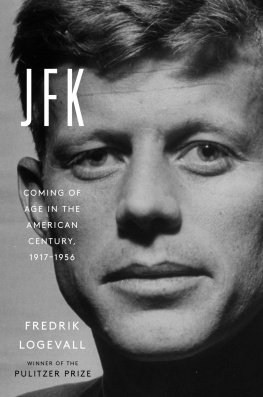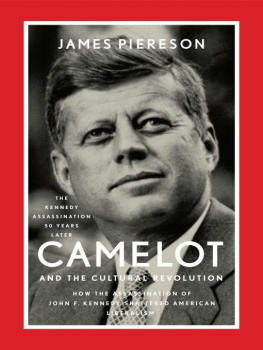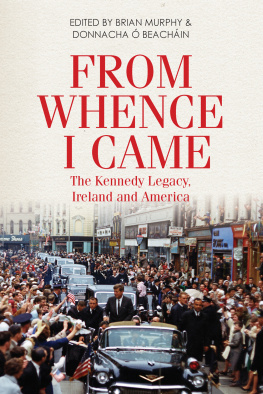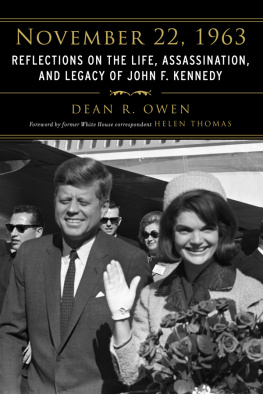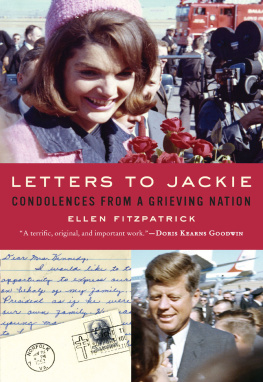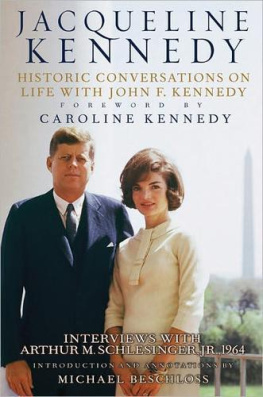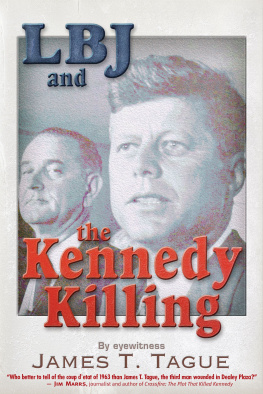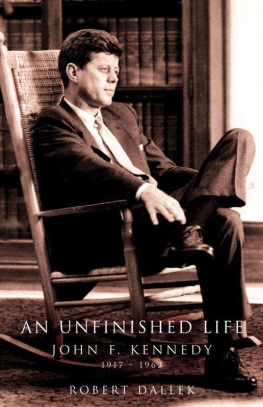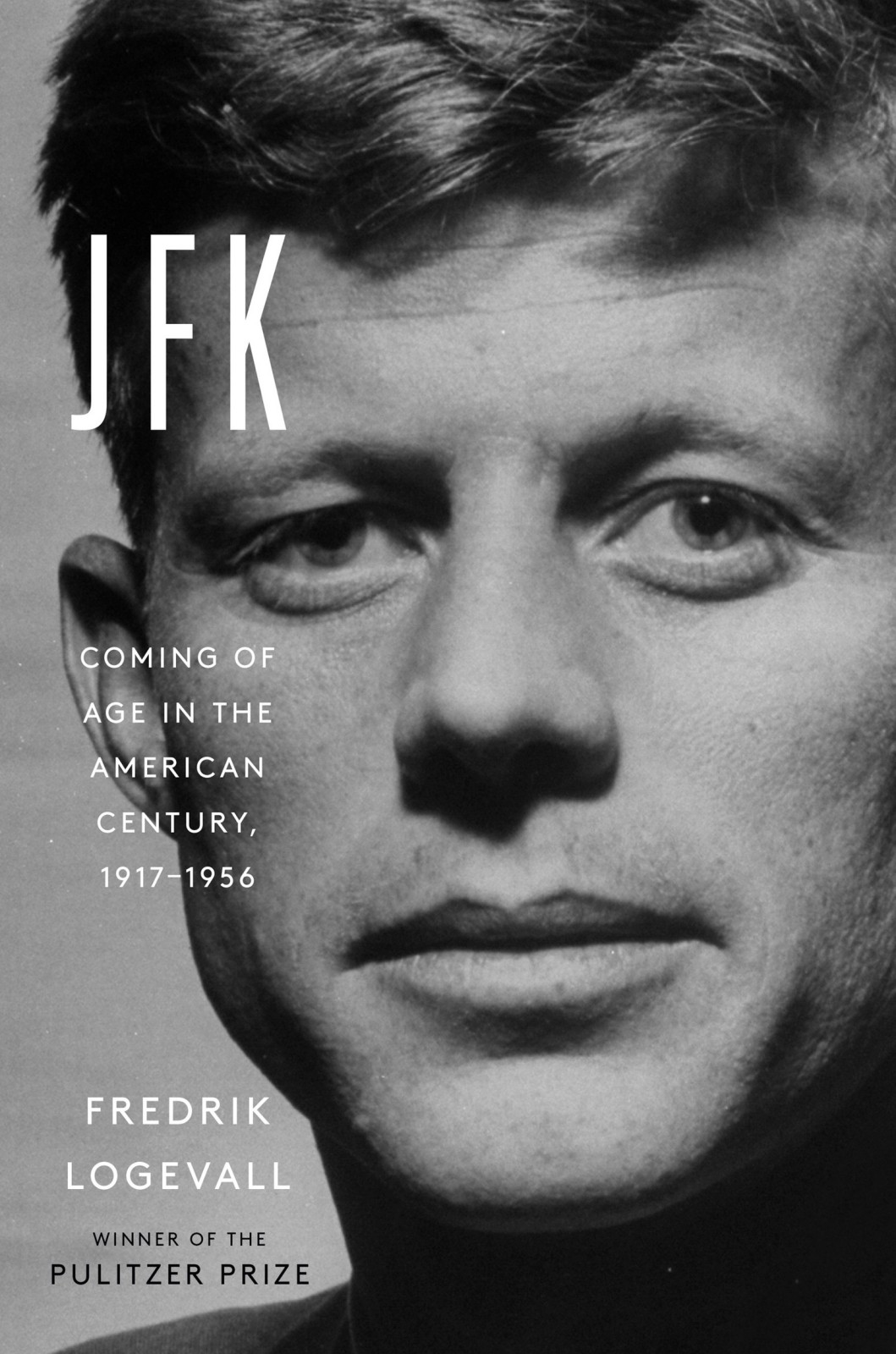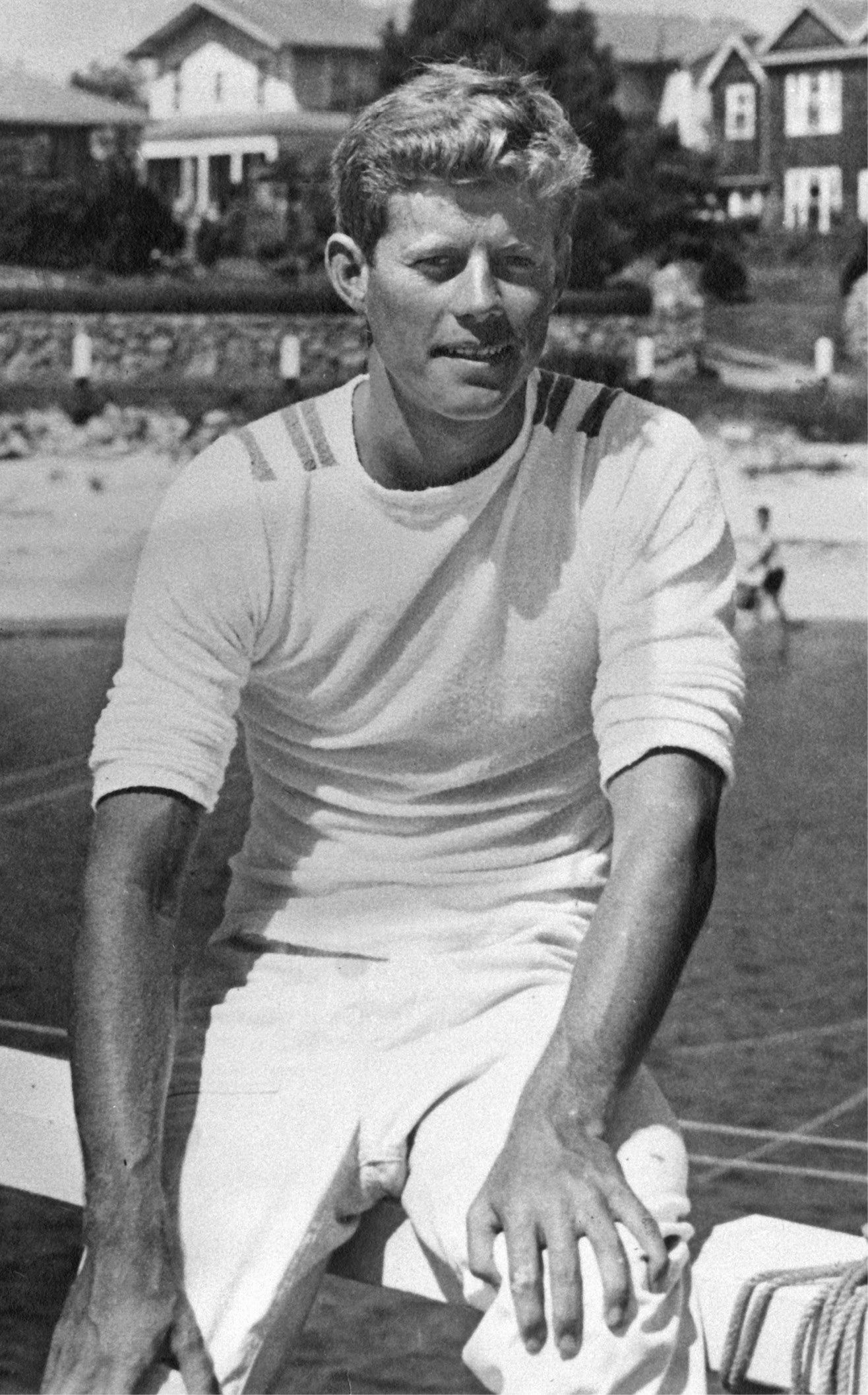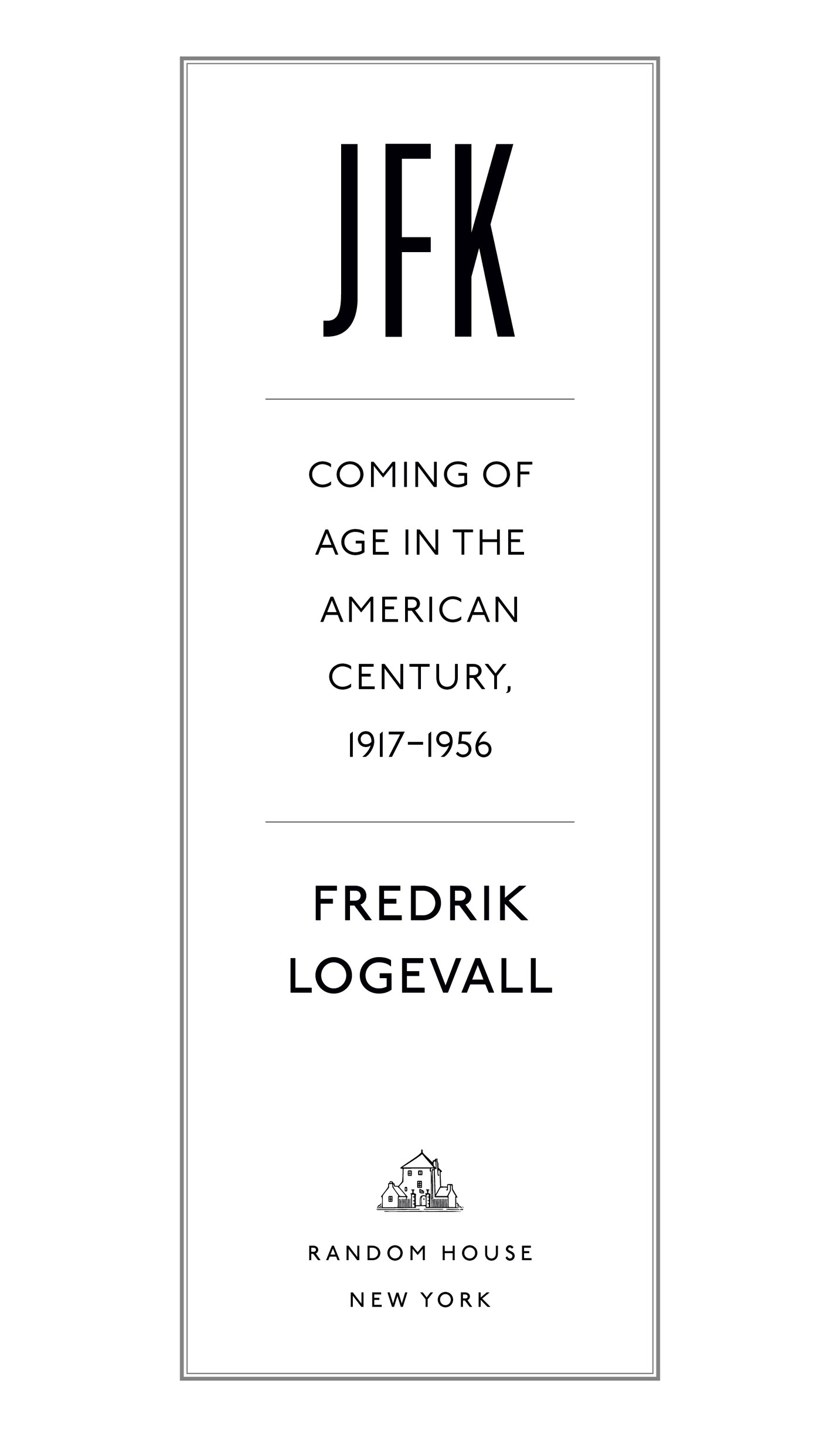Jack Kennedy in Hyannis Port, early 1940s.
Copyright 2020 by Fredrik Logevall
Maps copyright 2020 by David Lindroth Inc.
All rights reserved.
Published in the United States by Random House, an imprint and division of Penguin Random House LLC, New York.
R ANDOM H OUSE and the H OUSE colophon are registered trademarks of Penguin Random House LLC.
Excerpt from poem by Jacqueline Kennedy reprinted by permission of Ambassador Caroline Kennedy c/o the John F. Kennedy Presidential Library and Museum, Boston, Massachusetts.
LIBRARY OF CONGRESS CATALOGING-IN-PUBLICATION DATA
Names: Logevall, Fredrik, author.
Title: JFK / Fredrik Logevall.
Other titles: John Fitzgerald Kennedy
Description: New York : Random House, 2020 | Includes bibliographical references and index. | Contents: [Vol. 1] Coming of age in the American century, 19171956
Identifiers: LCCN 2020003488 (print) | LCCN 2020003489 (ebook) | ISBN 9780812997132 (v.1 ; hardcover) | ISBN 9780812997149 (v.1 ; ebook)
Subjects: LCSH: Kennedy, John F. (John Fitzgerald), 19171963. | Kennedy, John F. (John Fitzgerald), 19171963Family. | LegislatorsMassachusettsBiography. | United States. Congress. SenateBiography. | New EnglandPolitics and government20th century. United StatesPolitics and government19451989. | MassachusettsBiography. | PresidentsUnited StatesBiography.
Classification: LCC E842 .L.555 2020 (print) | LCC E842 (ebook) | DDC 973.922092 [B]dc23
LC record available at https://lccn.loc.gov/2020003488
LC ebook record available at https://lccn.loc.gov/2020003489
Ebook ISBN9780812997149
randomhousebooks.com
Book design by Jo Anne Metsch, adapted for ebook
Cover design: Lucas Heinrich
Cover photograph: Al Fenn/The LIFE Picture Collection/Getty Images
ep_prh_5.5.0_c0_r0
Contents
PREFACE
Early one morning in August 1939, twenty-two-year-old Jack Kennedy looked out his window at the Hotel Excelsior, in Berlin, not far from the Reich Chancellery, and caught a glimpse of things to come: on the street below, Nazi storm troopers marched by. A rising senior at Harvard, Kennedy was nearing the end of an extraordinary seven-month study-abroad adventure, one that had included stints working in the U.S. embassies in London (where his father was the ambassador) and Paris, as well as travels to a dozen countries in Europe and the Middle East. At each stop, hed used his fathers connections to meet with local officials and U.S. diplomats, asking questions, taking notes, and forming a picture of a world in crisis.
Now he was in Germanys capital, the nerve center of Nazi power. Rumors were rife that Hitlers armies were readying to invade Poland. Kennedy, a skeptic by nature, wasnt surethe German dictator might be bluffingbut he felt unease as he took in the atmosphere of tense expectancy in the city. At every turn, he saw evidence of fearsome Nazi propaganda at work as the authorities bombarded Berliners with supposed proof of heinous behavior by the contemptible Poles.
The following evening, shortly before midnight, came staggering news via Berlin radio: Germany and the Soviet Union, longtime bitter foes, would sign a nonaggression pact, with details to be worked out in Moscow in two days. Though many ordinary Germans were relievedsurely the Poles would now succumb without a fight, and the conflict would be resolved in much the same nonviolent way as the Czech crisis the previous yearseasoned diplomats, privy to official thinking in Warsaw and Paris and London, knew better.
The invasion came on September 1. By then Jack was back in London, joining his parents and eight siblings at the ambassadorial residence in Knightsbridge. On September 3, he and his mother, Rose, along with two of his siblingsolder brother Joe Junior and younger sister Kickwere in the visitors gallery of the House of Commons when Prime Minister Neville Chamberlain somberly affirmed what he had just announced in a radio broadcast: Britain was at war with Germany. Jacks worry as expressed to Lem Billings two weeks before had been borne out. Ambassador Joseph Kennedy, an unbending supporter of Chamberlains failed efforts to avert war through a policy of appeasement, had been moved almost to tears by the prime ministers mournful radio address. His wife felt the same as she took in Chamberlains remarks in the Commons.
For Jack, however, another speaker on this historic day left the deepest impression. Standing before the Commons as the incoming First Lord of the Admiralty, Winston Churchill summoned his compatriots to the glorious endeavor ahead: Outside, the storms of war may blow and the lands may be lashed with the fury of its gales, but in our own hearts this Sunday morning there is peace. Jack watched transfixed as Churchill declared, Our hands may be active, but our consciences are at rest.
A photo shows the three Kennedy siblingsvibrant and handsomeon their way to the Houses of Parliament:
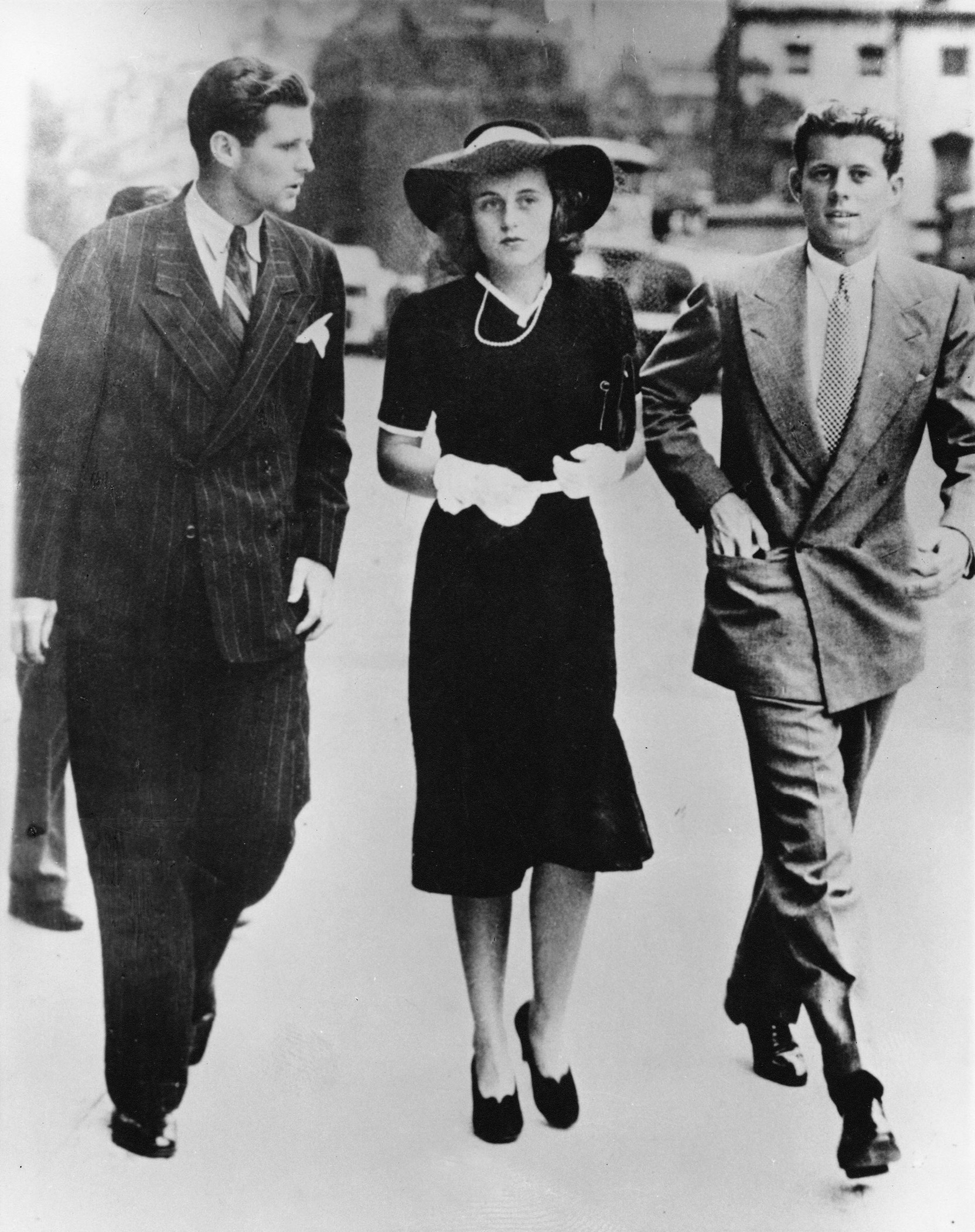
The trio understood that they were eyewitnesses to history. But they had no inkling of how much the war that was just beginning would transform the world and their place in it. In five years, Joe Junior would be erased from the picture, killed in action, and Kicks husband would also perish, mere weeks after their wedding. Joe Seniors public career would be destroyed. The war would also tear asunder the European-led international order, as Jack saw up close when he returned to the Continent in mid-1945 as a twenty-eight-year-old journalist and decorated veteran. Germany had capitulated, and its ally imperial Japan was ravaged, close to defeat. Much of Berlin, including the Excelsior, lay in ruins. Two Allied powers, the Soviet Union and the United States, stood supreme, eyeing each other warily as they began to fill the geopolitical vacuum left by the war. When Kennedy came back again in 1948, as a junior congressman, Kick, too, was gone, and the Soviets and Americans were locked in a tense Cold War, with Berlin a focal point. This superpower confrontation was still ongoing when now-President Kennedy returned yet again, in June 1963, and declared, before a rapturous audience of more than a million in West Berlin, Ich bin ein Berliner. Five months later, he met his death, felled by an assassins bullet while riding in an open-air limousine in Dallas.
World War II occupies a central place in this book, the first of two volumes on the life and times of John F. Kennedy. Born in 1917, during one world war and at the dawning of the American Century, he came of age in a second world war, then rose all the way to the presidency, only to be cut down at forty-six while leading a United States that stood at the zenith of its power. He was a man of privilege and wealth who endured chronic ill health and pain as well as immense personal tragedy, and whose storybook life captivated millions of peoplenot merely in the United States but abroad, not merely in death but in life. Known for his handsome looks, cool and graceful demeanor, and persistent womanizing, Kennedy was gifted and flawed, as a politician and as a person, and his thousand days in the White House saw missteps as well as successes. But through his magnetic leadership and inspirational rhetoric, he elevated Americans belief in the capacity of politics to solve big problems and speak to societys highest aspirations, while in foreign affairs he showed it was possible to move from bitter hostility toward the Soviet Union to coexistence. The public responded. By the middle of 1963, close to 60 percent of Americans claimed that they had voted for Kennedy in 1960, although only 49.7 percent had actually done so. After his death, his landslide grew to 65 percent. Kennedys average approval rating of 70 percent while in office puts him at the top among post-1945 American presidents, and later generations would rate his performance higher still.

